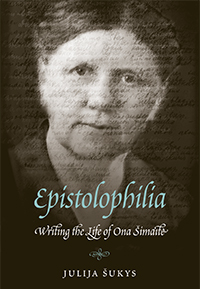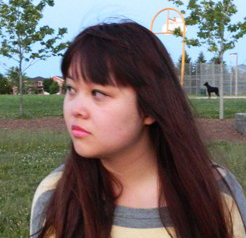Between 1941 and 1944, a Lithuanian librarian named Ona Šimaitė regularly smuggled food and other provisions into the Jewish ghetto of Nazi-occupied Vilnius and surrounding work camps. In 1944, Šimaitė was arrested by the Gestapo after they detected her activities. For 12 days, she was interrogated and tortured, then deported to the Dachau concentration camp. Despite Šimaitė’s role in Holocaust history, little is known about this heroine.
In 2000, Julija Šukys stumbled upon Šimaitė’s name while browsing through card catalogues as a U of T graduate student. Šukys’ book Epistolophilia: Writing the Life of Ona Šimaitė (University of Nebraska Press, 2012) involved eight years of delving into the personal writings of “a woman who, except to those who knew her and what she had done during a period of three years in Lithuania, had gone through life largely unseen.”
Initially, Šimaitė’s reasons for entering the ghetto were “very personal and friendship-oriented,” but she soon became a rescuer. Bypassing security to see her friends evolved into slipping sleeping children out in potato sacks, hiding adults in her own apartment and aiding the ghetto resistance. “She didn’t just decide to be a hero,” says Šukys (MA 1996, PhD 2001). “To her, it felt right – it was the only choice she had.”
 Šimaitė left behind a massive archive, including scores of diaries and thousands of pages of correspondence – she was specifically saving them for somebody. The difficulty of writing in a language spoken by only 3.5 million people, however, meant that the documents were not accessible to most scholars – but Šukys is fluent in Lithuanian, the language of her childhood.
Šimaitė left behind a massive archive, including scores of diaries and thousands of pages of correspondence – she was specifically saving them for somebody. The difficulty of writing in a language spoken by only 3.5 million people, however, meant that the documents were not accessible to most scholars – but Šukys is fluent in Lithuanian, the language of her childhood.
Šukys began to work on Šimaitė’s private texts because she was compelled by its “questions of silences and intimacies.” But many of the letters – which covered such topics as floor-washing, cats and movies – don’t tell us the stories we want to know, says Šukys. The hardest part was determining how to draw the story from a monumental collection of personal writings – to painstakingly work through both the overwhelming verbosity and silence.
“I really felt like she had been waiting for me,” says Šukys. “Šimaitė was helping me with some of my own questions – about women’s writing, history and the feminine – and in return, I was doing this for her.” In giving voice to a woman whose legacy may have otherwise been overlooked, Šukys was exposed to stories about the Holocaust in Lithuania that have, for the most part, remained hidden.
“My family comes from that part of the world, and I had grown up with certain versions of wartime stories that didn’t include a lot of details about German occupation,” says Šukys, who was born in Toronto and raised in Mississauga. “What I really wanted was someone from Lithuania speaking about a time and place that my grandmother told me about.”
Šukys’ memoir was recently shortlisted for the Mavis Gallant Prize in Non-fiction – and it still surprises her. “I was an unknown writer, writing about an unknown woman,” says Šukys. “It’s gratifying to know that the book is finding a readership.”
Click below to view an excerpt from Epistolophilia by Julija Šukys, by permission of the University of Nebraska Press.
Recent Posts
U of T’s 197th Birthday Quiz
Test your knowledge of all things U of T in honour of the university’s 197th anniversary on March 15!
Are Cold Plunges Good for You?
Research suggests they are, in three ways
Work Has Changed. So Have the Qualities of Good Leadership
Rapid shifts in everything from technology to employee expectations are pressuring leaders to constantly adapt






